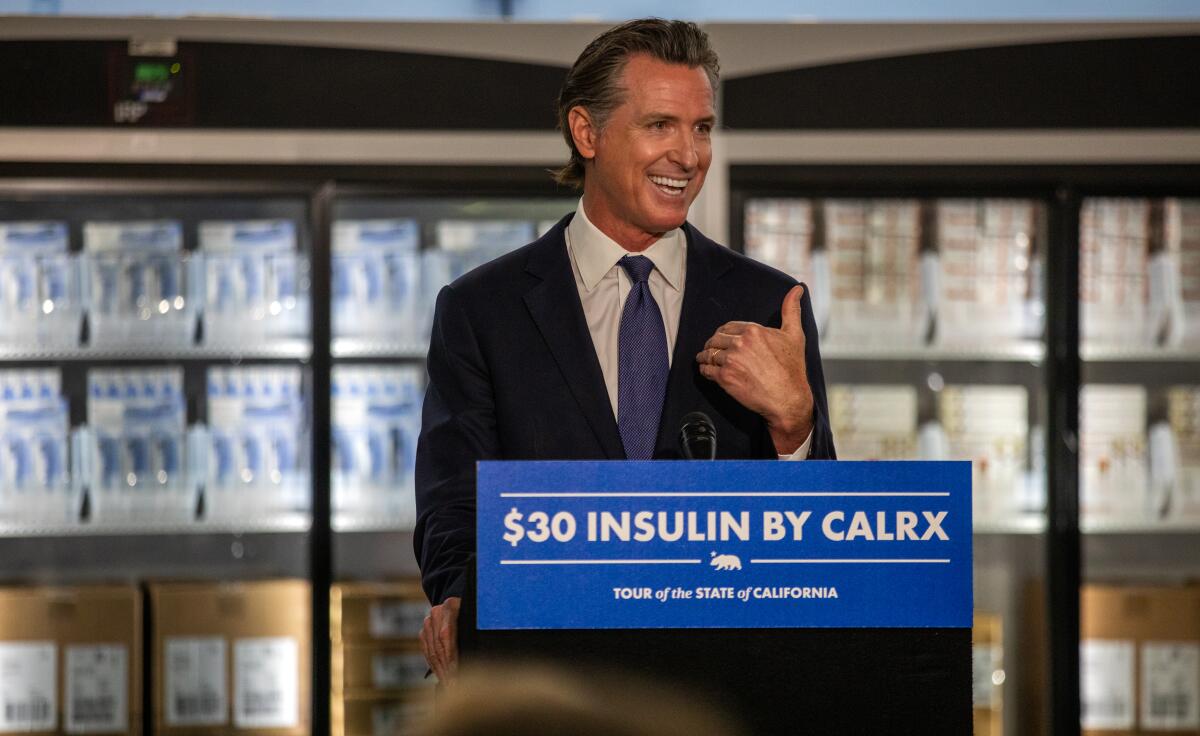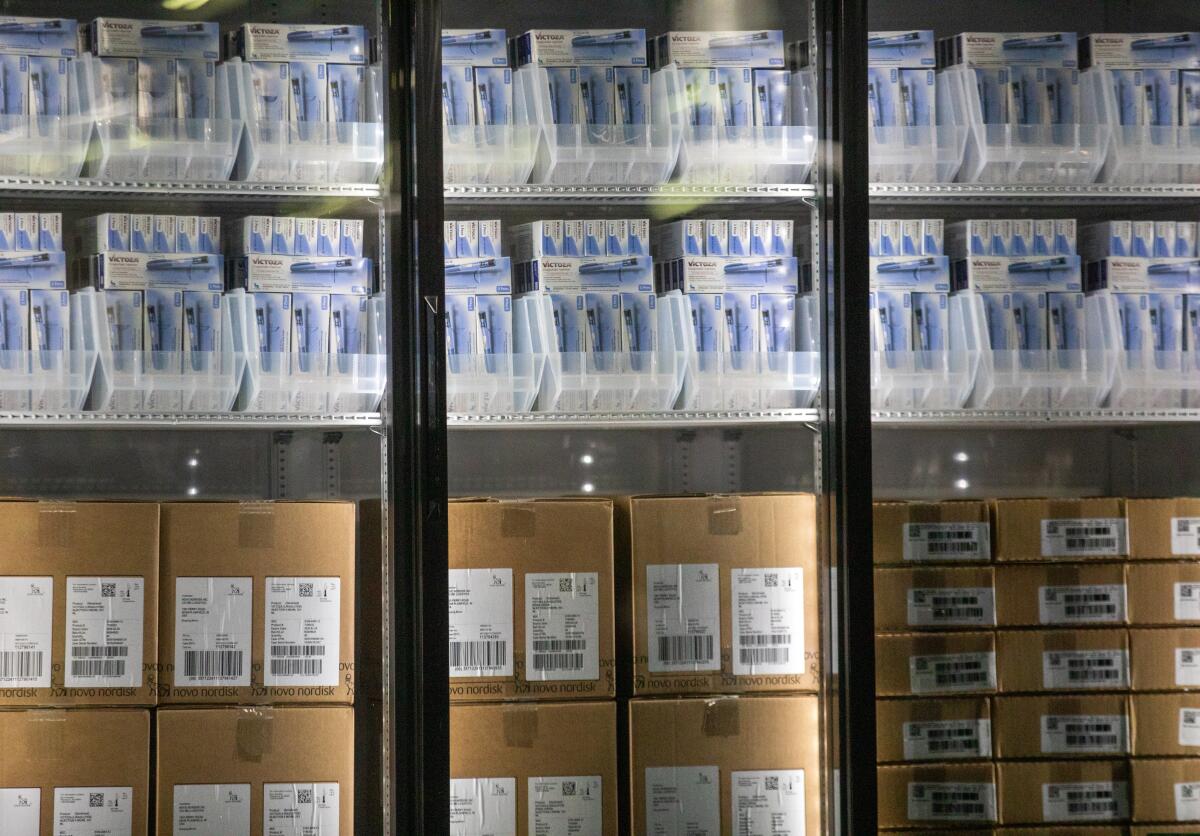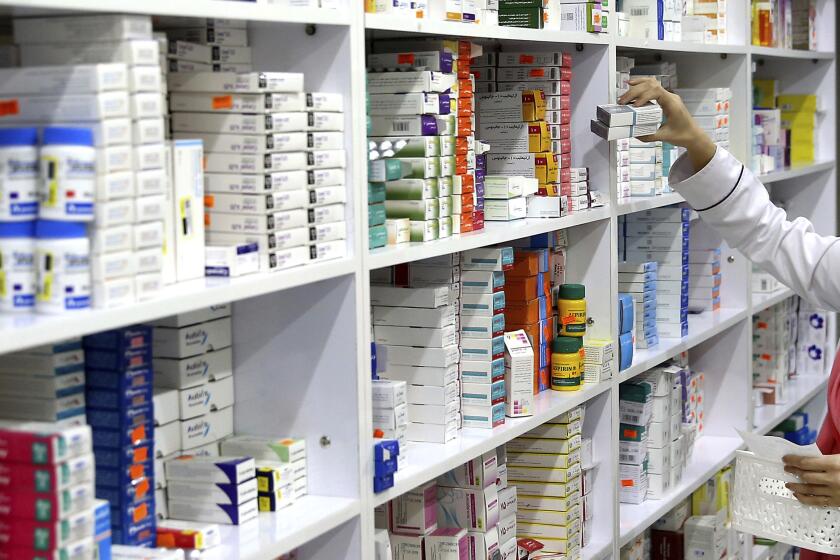Newsom announces $50-million contract to make California’s own brand of insulin

- Share via
Gov. Gavin Newsom announced a new $50-million contract with the nonprofit generic drugmaker Civica to produce insulin under the state’s own label during a news conference Saturday in Downey.
Newsom originally declared his intent to produce generic drugs three years ago in an attempt to lower the cost of pharmaceutical products for Californians who struggle to afford often life-saving medication. Pending approval by the U.S. Food and Drug Administration, the deal with Civica would provide the first pharmaceutical product made under the CalRX brand of generic drugs.
Under the deal, a 10-milliliter vial — normally costing $300 — would be made available for the same $30 it costs the state to manufacture and distribute the drug, according to the governor’s office. Newsom’s office said that as a result of such sharply reduced prices, patients who pay out of pocket for insulin would save between $2,000 and $4,000 annually.
“This is a big deal, folks,” Newsom said. “This is not happening anywhere else in the United States.”
The governor and other officials touted that doing so would lower costs across the board, not just for the consumer ultimately picking up the drug. That makes it different, Newsom said, than the recent announcements by pharmaceutical companies about reducing their insulin prices.
“Do not be misled. These companies that all of a sudden are jumping over each other to rush in this direction — they’re just providing discount cards,” he said. “Those costs are being borne by the plans. Those costs are being socialized and shifted to everybody else.”
“What this does,” he said, “is a game changer. This fundamentally lowers the cost. Period. Full stop.”
Californians could get the CalRx generic insulin at a local pharmacy or through mail order pharmacies without a new prescription, state officials said, and it would be available to everyone regardless of their insurance plan. The next step is for Civica to identify a California-based manufacturing facility, according to the governor’s office.
California Health and Human Services Secretary Dr. Mark Ghaly said that under the deal, Civica would commit to delivering as much insulin as California needs under the CalRx label. Civica said it would be manufacturing the three insulins most commonly used by U.S. citizens.
The governor said the state will turn next to manufacturing its own naloxone — a medication that can save lives by reversing opioid overdoses. The state is exploring opportunities to produce the drug as part of its plan to combat the deadly effects of fentanyl, an especially potent synthetic opioid, Newsom said.
Gov. Gavin Newsom’s new state budget will call for California to produce its own brand of generic prescription drugs to drive down healthcare costs.
Newsom said state officials are looking into producing both injectable and nasally administered naloxone, and he wants it to be available over the counter.
The governor promoted the contract with Civica on the third day of his State of the State policy tour around California.
Newsom, who dislikes reading off teleprompters because of his dyslexia, ditched the typical speech outlining his agenda to lawmakers at the state Capitol in exchange for a road show with policy announcements in Sacramento, the San Francisco Bay Area, Los Angeles and San Diego through Sunday.

He delivered his remarks Saturday in front of a bank of fridges stocked with white boxes of insulin, at an unfussy pharmacy in Downey that is part of the Kaiser Permanente system.
Before he spoke, Niketa Calame-Harris, advocacy committee chair for Southern California for the American Diabetes Assn., recounted her personal experiences with Type 1 diabetes.
As a young adult, “there were many times where I was scrambling, trying to muster up $100, $200 for a little vial of insulin that was literally going to keep me alive,” Calame-Harris said.
“I once went without insulin for just five hours — and I was in the ICU for two weeks.”
The contract marks a major step forward for Newsom and his quest to deliver on his promises to lower prescription drug costs, which have been slow to get off the ground.
Newsom first unveiled his proposal for California to make its own line of generic drugs in 2020 to increase competition in the generic drug market and lower prices for everyone.
The governor signed legislation that year to require the state to seek contracts to produce or distribute generic prescription drugs, including insulin.
In a video posted to Twitter last summer, Newsom hyped a $100-million budget allocation for the plan. He said “$50 million will go towards the development of low cost insulin products and an additional $50 million will go towards a California based insulin manufacturing facility.”
With FDA approval, the contract announced Saturday is expected to deliver insulin to Californians starting in 2024, Newsom said. Civica will begin manufacturing the drug later this year under a 10-year agreement with the state, the provisions of which go into effect once the first delivery is made, Newsom said.
Ghaly said Saturday that the journey to produce insulin began with the question of how California could harness its power as the most populated state in the nation to disrupt the pharmaceutical market.
The process has taken time because “this has been something we sought to do right,” Ghaly said.
Anthony Wright, executive director of Health Access California, said one could argue California’s effort has already made a significant impact.
Eli Lilly & Co. announced plans earlier this month to reduce the price of its insulin products as much as 70%. Novo Nordisk made a similar announcement to cap out-of-pocket costs this week and Sanofi followed suit Thursday.
Last year Congress also passed the Inflation Reduction Act, which capped insulin copays at $35 per month for patients covered by Medicare as of Jan. 1.
“I don’t want to overstate that this would be the only factor, but California and other efforts to manufacture competing insulin products was a contributing factor to that decision for the incumbent insulin manufacturers to lower their prices,” Wright said.
California Atty. Gen. Rob Bonta said that Eli Lilly, Sanofi and Novo Nordisk are finding ways to “aggressively hike” the price of insulin at the expense of many patients.
California also followed other states in January and sued the nation’s three largest insulin makers over the high cost of the drug.
At a recent news conference announcing the lawsuit against Eli Lilly, Sanofi and Novo Nordisk, California Atty. Gen. Rob Bonta said the companies are finding ways to “aggressively hike” the price of insulin at the expense of many patients.
Though the Legislative Analyst’s Office has questioned the feasibility of Newsom’s plan, Wright said it makes sense for the state to continue down the path because it pressures drugmakers to reduce costs.
“If we don’t sell a single vial of insulin, but the price drops, that provides a savings for our Medi-Cal program, for CalPERS and for all the ways that we’re buying for millions of Californians,” he said.
More to Read
Sign up for Essential California
The most important California stories and recommendations in your inbox every morning.
You may occasionally receive promotional content from the Los Angeles Times.














